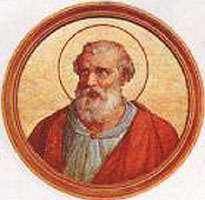 Although the pontificate of St. Anastasius was brief, he had time to show
that watchful care for the preservation of pure doctrine which
distinguishes the holders of the Roman See. A Roman, the son of Maximus,
Anastasius was elected to succeed Siricius in 399.
Although the pontificate of St. Anastasius was brief, he had time to show
that watchful care for the preservation of pure doctrine which
distinguishes the holders of the Roman See. A Roman, the son of Maximus,
Anastasius was elected to succeed Siricius in 399.
One of his first problems was an appeal which had been made to Pope
Siricius. At this time (and many other times too) the writings of Origen
enjoyed a great vogue. This brilliant but erratic third-century writer
exercised a charm over men's minds which, in view of his sometimes less
than orthodox opinions, could be dangerous. St. Jerome himself, grim
watchdog of orthodoxy that he was, had issued an expurgated edition of
Origen's Homilies. But heretics were now appealing to the authority of
Origen and it was imprudent of St. Jerome's old friend Rufinus to choose
this moment for a translation of Origen's philosophical study, Peri Archon.
He explained, however, that since a greater name had already translated
Origen's Homilies he felt justified. Jerome was furious. Not at all
mollified by the reference to one greater, he attacked his old friend with
bitterness. Then Rufinus became angry and told his reading public quite
bluntly that Jerome was a defamer. The East rang with the shock of this
battle of words, and an appeal was made to the Pope. Siricius, probably in
view of the personalities involved, had been slow to act, but now St.
Anastasius felt that the time had come to speak out. He condemned Origen
and deprecated the translation of Rufinus. Shortly after the Pope spoke,
the imperial government banned the works of Origen.
St. Anastasius also wrote to the bishops of Africa urging them to keep up
the good fight against the Donatist heretics. But again, like so many
popes, he was merciful to repentant heretics.
Evidently there was some trouble about unauthorized priests drifting in to
Rome, for Anastasius ordered that no priest from across the sea should be
received unless he had a letter signed by five bishops. He also decreed
that priests should stand with heads bowed while the gospel was being
read.
He built a basilica called the Crescentian.
St. Anastasius was a friend of the great Fathers of the Church, St.
Augustine, St. Jerome, and St. Paulinus. St. Paulinus had a pleasant visit
with the Pope. St. Anastasius died in December 401 with the empire on the
brink of disaster. St. Jerome says that he was a man of apostolic zeal and
great poverty, and that Rome did not deserve to possess him long lest the
world's head be cut off while ruled by such a bishop. His feast is kept on
December 16.
Excerpted from "Popes
Through the Ages" by Joseph Brusher, S.J.

